| Listing 1 - 10 of 236 | << page >> |
Sort by
|
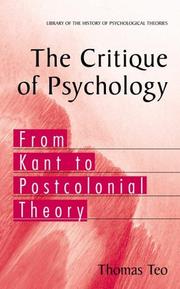
ISBN: 128062387X 9786610623877 0387253564 0387253556 1441920528 Year: 2005 Publisher: New York : Springer,
Abstract | Keywords | Export | Availability | Bookmark
 Loading...
Loading...Choose an application
- Reference Manager
- EndNote
- RefWorks (Direct export to RefWorks)
Teo describes two centuries of challenges to mainstream psychological thinking along with the mainstream's reactions.
Psychology --- Psychology and philosophy. --- History. --- Philosophy and psychology --- Philosophy --- History of Psychology. --- Psychology. --- Behavioral sciences --- Mental philosophy --- Mind --- Science, Mental --- Human biology --- Soul --- Mental health
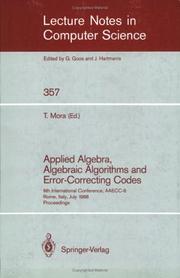
ISBN: 3540510834 0387510834 3540461523 Year: 1989 Volume: vol 357 Publisher: Berlin New York Paris Springer
Abstract | Keywords | Export | Availability | Bookmark
 Loading...
Loading...Choose an application
- Reference Manager
- EndNote
- RefWorks (Direct export to RefWorks)
In 1988, for the first time, the two international conferences AAECC-6 and ISSAC'88 (International Symposium on Symbolic and Algebraic Computation, see Lecture Notes in Computer Science 358) have taken place as a Joint Conference in Rome, July 4-8, 1988. The topics of the two conferences are in fact widely related to each other and the Joint Conference presented a good occasion for the two research communities to meet and share scientific experiences and results. The proceedings of the AAECC-6 are included in this volume. The main topics are: Applied Algebra, Theory and Application of Error-Correcting Codes, Cryptography, Complexity, Algebra Based Methods and Applications in Symbolic Computing and Computer Algebra, and Algebraic Methods and Applications for Advanced Information Processing. Twelve invited papers on subjects of common interest for the two conferences are divided between this volume and the succeeding Lecture Notes volume devoted to ISSACC'88. The proceedings of the 5th conference are published as Vol. 356 of the Lecture Notes in Computer Science.
Computer science --- Information systems --- 681.3*E3 --- 681.3*E4 --- 681.3*F2 --- 681.3*G2 --- 681.3*I1 --- Data encryption: data encryption standard; DES; public key cryptosystems --- Coding and information theory: data compaction and compression; formal modelsof communication; nonsecret encoding schemes--See also {681.3*H11} --- Analysis of algorithms and problem complexity--See also {681.3*B6}; {681.3*B7}; {681.3*F13} --- Discrete mathematics (Mathematics of computing) --- Algebraic manipulation (Computing methodologies) --- 681.3*I1 Algebraic manipulation (Computing methodologies) --- 681.3*G2 Discrete mathematics (Mathematics of computing) --- 681.3*F2 Analysis of algorithms and problem complexity--See also {681.3*B6}; {681.3*B7}; {681.3*F13} --- 681.3*E4 Coding and information theory: data compaction and compression; formal modelsof communication; nonsecret encoding schemes--See also {681.3*H11} --- 681.3*E3 Data encryption: data encryption standard; DES; public key cryptosystems --- Programming languages (Electronic computers) --- Congresses --- Error-correcting codes (Information theory) --- Algebra --- Computer algorithms --- Congresses. --- Data processing --- Algebra. --- Mathematics. --- Coding theory. --- Applications of Mathematics. --- Coding and Information Theory. --- Symbolic and Algebraic Manipulation. --- Data processing. --- Data compression (Telecommunication) --- Digital electronics --- Information theory --- Machine theory --- Signal theory (Telecommunication) --- Computer programming --- Math --- Science --- Mathematics --- Mathematical analysis
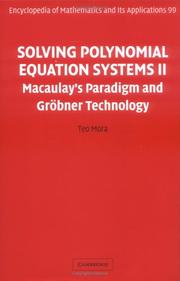
ISBN: 0521811562 9780521811569 Year: 2005 Volume: 99 Publisher: Cambridge: Cambridge university press,
Abstract | Keywords | Export | Availability | Bookmark
 Loading...
Loading...Choose an application
- Reference Manager
- EndNote
- RefWorks (Direct export to RefWorks)
Equations --- Iterative methods (Mathematics) --- numerical solutions --- 512.62 --- -Iterative methods (Mathematics) --- Polynomials --- Algebra --- Mathematics --- Iteration (Mathematics) --- Numerical analysis --- Fields. Polynomials --- Numerical solutions --- 512.62 Fields. Polynomials --- Equations - numerical solutions
Book
ISBN: 9462094020 9462094047 9462094039 Year: 2013 Publisher: Rotterdam : SensePublishers : Imprint: SensePublishers,
Abstract | Keywords | Export | Availability | Bookmark
 Loading...
Loading...Choose an application
- Reference Manager
- EndNote
- RefWorks (Direct export to RefWorks)
As part of their research activities, researchers in all areas of education develop measuring instruments, design and conduct experiments and surveys, and analyze data resulting from these activities. Educational research has a strong tradition of employing state-of-the-art statistical and psychometric (psychological measurement) techniques. Commonly referred to as quantitative methods, these techniques cover a range of statistical tests and tools. Quantitative research is essentially about collecting numerical data to explain a particular phenomenon of interest. Over the years, many methods and models have been developed to address the increasingly complex issues that educational researchers seek to address. This handbook serves to act as a reference for educational researchers and practitioners who desire to acquire knowledge and skills in quantitative methods for data analysis or to obtain deeper insights from published works. Written by experienced researchers and educators, each chapter in this handbook covers a methodological topic with attention paid to the theory, procedures, and the challenges on the use of that particular methodology. It is hoped that readers will come away from each chapter with a greater understanding of the methodology being addressed as well as an understanding of the directions for future developments within that methodological area.
Education -- Research -- Methodology. --- Quantitative research. --- Education --- Social Sciences --- Theory & Practice of Education --- Research --- Methodology. --- Data analysis (Quantitative research) --- Exploratory data analysis (Quantitative research) --- Quantitative analysis (Research) --- Quantitative methods (Research) --- Education. --- Education, general. --- Children --- Education, Primitive --- Education of children --- Human resource development --- Instruction --- Pedagogy --- Schooling --- Students --- Youth --- Civilization --- Learning and scholarship --- Mental discipline --- Schools --- Teaching --- Training --- pedagogisk forskning --- pedagogikk --- kvantitative forskningsmetoder
Book
ISBN: 946091487X 9460914861 Year: 2011 Publisher: Rotterdam : Sense Publishers,
Abstract | Keywords | Export | Availability | Bookmark
 Loading...
Loading...Choose an application
- Reference Manager
- EndNote
- RefWorks (Direct export to RefWorks)
Technology acceptance can be defined as a user’s willingness to employ technology for the tasks it is designed to support. Over the years, acceptance researchers have become more interested in understanding the factors influencing the adoption of technologies in various settings. From the literature, much research has been done to understand technology acceptance in the business contexts. This is understandable, given the close relationship between the appropriate uses of technology and profit margin. In most of the acceptance studies, researchers have sought to identify and understand the forces that shape users’ acceptance so as to influence the design and implementation process in ways to avoid or minimize resistance or rejection when users interact with technology. Traditionally, it has been observed that developers and procurers of technological resources could rely on authority to ensure that technology was used, which is true in many industrial and organizational contexts. However, with the increasing demands for educational applications of information technology and changing working practices, there is s need to re-examine user acceptance issues as they emerge within and outside of the contexts in which technology was implemented. This is true in the education milieu where teachers exercise the autonomy to decide on what and how technology will be used for teaching and learning purposes. Although they are guided by national and local policies to use technology in the classrooms, teachers spent much of their planning time to consider how technology could be harnessed for effective lesson delivery and assessment to be conducted. These circumstances have provided the impetus for researchers to study technology acceptance in educational settings. Although these studies have typically involved students and teachers as participants, their findings have far-reaching implications for school leaders, policy makers, and other stakeholders. The book is a critical and specialized source that describes recent research on technology acceptance in education represented by educators and researchers from around the world such as Australia, Belgium, China, Hong Kong, Malaysia, Singapore, United Kingdom, and United States of America.
Educational technology. --- Education --- Social Sciences --- Theory & Practice of Education --- Education, Special Topics --- Instructional technology --- Technology in education --- Education. --- Educational Technology. --- Technology --- Educational innovations --- Instructional systems --- Teaching --- Aids and devices --- Children --- Education, Primitive --- Education of children --- Human resource development --- Instruction --- Pedagogy --- Schooling --- Students --- Youth --- Civilization --- Learning and scholarship --- Mental discipline --- Schools --- Training
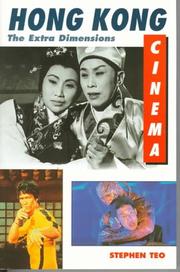
ISBN: 0851705146 9780851705149 0851704964 Year: 1997 Publisher: London : BFI Publishing,
Abstract | Keywords | Export | Availability | Bookmark
 Loading...
Loading...Choose an application
- Reference Manager
- EndNote
- RefWorks (Direct export to RefWorks)
Motion pictures --- Motion picture industry --- History --- Cinéma --- Acteurs de cinéma --- Chine --- Hong Kong (Chine) --- Histoire et critique
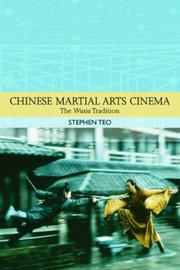
ISBN: 9780748632855 9780748632862 0748632867 0748632859 9780748632510 0748632514 1282088068 9781282088061 9780748670833 0748670831 1784023299 9786612088063 Year: 2009 Publisher: Edinburgh Edinburgh University Press
Abstract | Keywords | Export | Availability | Bookmark
 Loading...
Loading...Choose an application
- Reference Manager
- EndNote
- RefWorks (Direct export to RefWorks)
This is the first comprehensive, fully-researched account of the historical and contemporary development of the traditional martial arts genre in the Chinese cinema known as wuxia (literal translation: martial chivalry) - a genre which audiences around the world became familiar with through the phenomenal 'crossover' hit Crouching Tiger, Hidden Dragon (2000). The book unveils rich layers of the wuxia tradition as it developed in the early Shanghai cinema in the late 1920s, and from the 1950s onwards, in the Hong Kong and Taiwan film industries. Key attractions of the book are analyses of: *The history of the tradition as it began in the Shanghai cinema, its rise and popularity as a serialized form in the silent cinema of the late 1920s, and its eventual prohibition by the government in 1931. *The fantastic characteristics of the genre, their relationship with folklore, myth and religion, and their similarities and differences with the kung fu sub-genre of martial arts cinema. *The protagonists and heroes of the genre, in particular the figure of the female knight-errant. *The chief personalities and masterpieces of the genre - directors such as King Hu, Chu Yuan, Zhang Che, Ang Lee, Zhang Yimou, and films such as Come Drink With Me (1966), The One-Armed Swordsman (1967), A Touch of Zen (1970-71), Hero (2002), House of Flying Daggers (2004), and Curse of the Golden Flower (2006).
Film --- China --- Martial arts films --- Martial arts --- Motion pictures --- Films d'arts martiaux --- Arts martiaux --- Cinéma --- History and criticism --- Histoire et critique --- Combat --- Self-defense --- In motion pictures. --- Martial arts in motion pictures. --- Kung fu films --- Spaghetti Easterns --- Action and adventure films --- Geschichte 1920-2002
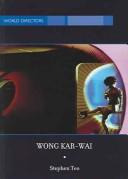
ISBN: 1844570290 1844570282 Year: 2006 Publisher: London British Film Institute
Abstract | Keywords | Export | Availability | Bookmark
 Loading...
Loading...Choose an application
- Reference Manager
- EndNote
- RefWorks (Direct export to RefWorks)
Kar-Wai, Wong --- Wong, Kar-Wai, --- Stephen Teo --- Hong Kong Cinema --- Wong Kar-Wai --- Kar-Wai Wong --- 791.471 WONG --- Wong, Kar-wai, --- #SBIB:309H1323 --- film --- filmregisseurs --- Hong Kong --- twintigste eeuw --- eenentwintigste eeuw --- Films met een amusementsfunctie en/of esthetische functie: auteurs --- Criticism and interpretation. --- Motion picture producers and directors --- Motion pictures --- Producteurs et réalisateurs de cinéma --- Cinéma
Book
ISBN: 1137596511 1137596503 Year: 2018 Publisher: London : Palgrave Macmillan UK : Imprint: Palgrave Macmillan,
Abstract | Keywords | Export | Availability | Bookmark
 Loading...
Loading...Choose an application
- Reference Manager
- EndNote
- RefWorks (Direct export to RefWorks)
Outline of Theoretical Psychology discusses basic philosophical problems in the discipline and profession of psychology. The author addresses such topics as what it means to be human in psychology; how psychological knowledge is possible and what it consists of; the role of social justice in psychology; and how aesthetic experience could help us to understand the human condition. Proposing possible solutions to a range of such issues, Thomas Teo situates theoretical questions within traditional branches of philosophical inquiry: ontology, epistemology, ethics, and aesthetics. This book argues that in order to improve psychology as a discipline and in practice, psychologists must reconceive the unit of psychological analysis, looking beyond individual capacity and even experience. By engaging with these basic philosophical problems, Teo demonstrates how psychology can avoid its common pitfalls and continue as a force for resistance and the good.
Psychology. --- Aesthetics. --- Epistemology. --- Ontology. --- Psychology --- Psychological measurement. --- Critical psychology. --- History of Psychology. --- Critical Psychology. --- Psychological Methods/Evaluation. --- Methodology. --- Psychological tests and testing. --- Genetic epistemology. --- History. --- Philosophy. --- Beautiful, The --- Beauty --- Esthetics --- Taste (Aesthetics) --- Philosophy --- Art --- Criticism --- Literature --- Proportion --- Symmetry --- Being --- Metaphysics --- Necessity (Philosophy) --- Substance (Philosophy) --- Developmental psychology --- Knowledge, Theory of --- Psychology, Critical --- Communism and psychology --- Psychology—Methodology. --- Epistemology --- Theory of knowledge --- Measurement, Mental --- Measurement, Psychological --- Psychological measurement --- Psychological scaling --- Psychological statistics --- Psychometry (Psychophysics) --- Scaling, Psychological --- Psychological tests --- Scaling (Social sciences) --- Behavioral sciences --- Mental philosophy --- Mind --- Science, Mental --- Human biology --- Soul --- Mental health --- Measurement --- Scaling --- Methodology --- Radio broadcasting Aesthetics --- Aesthetics --- Social sciences—History. --- Knowledge, Theory of. --- Psychological Methods. --- Social sciences
Book
ISBN: 1461455820 1461455847 1785396552 1461455839 Year: 2014 Publisher: New York, NY : Springer New York : Imprint: Springer,
Abstract | Keywords | Export | Availability | Bookmark
 Loading...
Loading...Choose an application
- Reference Manager
- EndNote
- RefWorks (Direct export to RefWorks)
Encyclopedia of Critical Psychology is a comprehensive reference work and is the first reference work in English that comprehensively looks at psychological topics from critical as well as international points of view. Thus, it will appeal to all committed to a critical approach across the Encyclopedia of Critical Psychology, for alternative analyses of psychological events, processes, and practices. The Encyclopedia of Critical Psychology provides commentary from expert critical psychologists from around the globe who will compose the entries. The Encyclopedia of Critical Psychology will feature approximately 1,000 invited entries, organized in an easy to use A-Z format. The encyclopedia will be compiled under the direction of the editor who has published widely in the field of critical psychology and due to his international involvements is knowledgeable about the status of critical psychology around the world. The expert contributors will summarize current critical-psychological knowledge and discuss significant topics from a global perspective.
Psychology. --- Cross-cultural psychology. --- Cross Cultural Psychology. --- History of Psychology. --- Applied psychology. --- Psychology --- History. --- Applied psychology --- Psychagogy --- Psychology, Practical --- Social psychotechnics --- Behavioral sciences --- Mental philosophy --- Mind --- Science, Mental --- Human biology --- Philosophy --- Soul --- Mental health --- Cross-cultural psychology --- Ethnic groups --- Ethnic psychology --- Folk-psychology --- Indigenous peoples --- National psychology --- Psychological anthropology --- Psychology, Cross-cultural --- Psychology, Ethnic --- Psychology, National --- Psychology, Racial --- Race psychology --- National characteristics --- Ethnopsychology. --- Social sciences --- Cross-Cultural Psychology.
| Listing 1 - 10 of 236 | << page >> |
Sort by
|

 Search
Search Feedback
Feedback About UniCat
About UniCat  Help
Help News
News